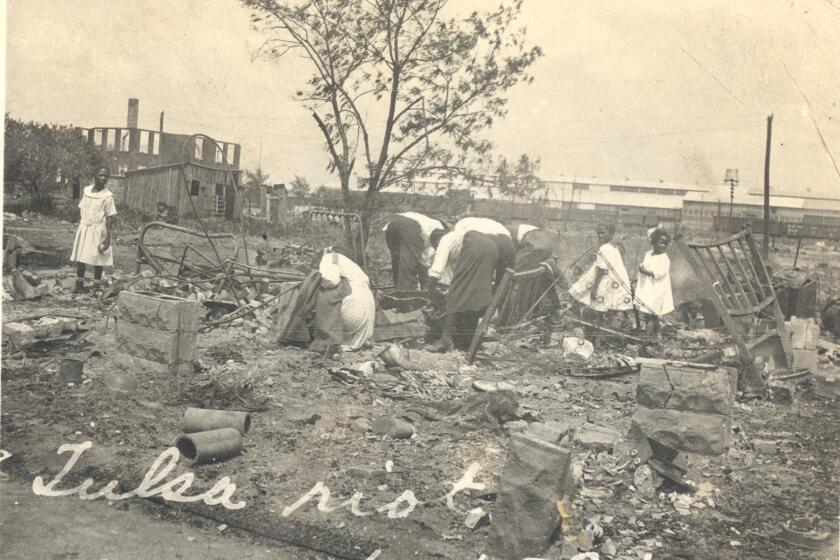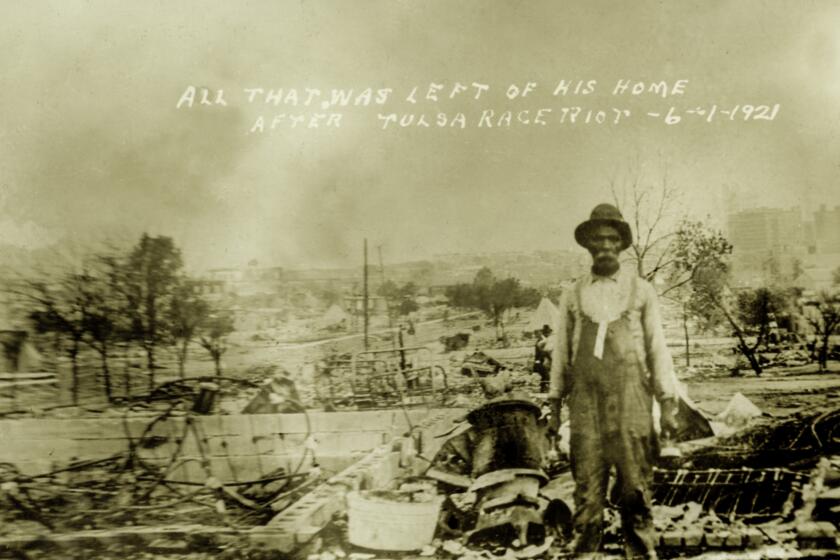Biden honors victims of Tulsa Race Massacre at centennial event

President Biden led a remembrance Tuesday of one of the nation’s darkest — and long suppressed — moments of racial violence, marking the 100th anniversary of the destruction of a thriving Black community in Tulsa, Okla.
- Share via
WASHINGTON — President Biden traveled to Tulsa, Okla., on Tuesday to mark a shameful and largely forgotten part of American history, calling for racial reconciliation on the 100th anniversary of the violent destruction of the city’s thriving Black community by a white mob.
Biden became the first president to participate in a public remembrance of the 1921 race riot that left hundreds of Black people dead and burned what was known as “Black Wall Street” to the ground.
Incited by a local newspaper’s reports that a Black male had been accused of stepping on a white girl’s foot, Tulsa’s white residents and civil society leaders confronted a group of Black Tulsans trying to protect the accused from a lynch mob. The white rioters unleashed violence on a massive scale, looting, setting fire to the Greenwood district and even using small airplanes to drop projectiles on it.
“My fellow Americans, this was not a riot,” Biden said before a crowd of roughly 200 people, including many descendants of victims. “This was a massacre — among the worst in our history, but not the only one. And for too long, forgotten by our history.”
Describing the events of May 31 and June 1, 1921, in harrowing details — a Black man being dragged to death, a couple being shot in their home, eight churches being burned to the ground, bodies being dumped in mass graves — Biden urged the country to bear witness at long last.
“We do ourselves no favors pretending that none of this happened,” he said. “We can’t just learn what we want to know, but what we should know ... the good, the bad ... everything. That’s what great nations do. They come to terms with their dark sides.”
The high-profile visit comes amid another national reckoning on race and is in keeping with Biden’s campaign promise to focus on issues of racial equity. It’s a promise that, by its very necessity, underlines the persistence of racism and prejudice in a country founded on the idea of equality.
Just last week, Biden played host at the White House to relatives of George Floyd, the Black man killed a year ago when a Minneapolis police officer knelt on his neck for more than nine minutes.
But the visit did not coincide with any action by lawmakers, a reminder that the president can achieve only so much alone. Congress has been slow to act on police reform legislation, despite Biden’s urging.
And although Democrats are set to take up voting rights legislation this month, they are unlikely to meet the 60-vote threshold needed to overcome a GOP filibuster under current Senate rules. Rather than expanding voting rights, many Republican-led states are enacting new laws making it harder for people to cast ballots.
Calling those laws an “unprecedented assault on our democracy,” Biden vowed that June would be “a month of action” in Congress on voting rights. He announced that Vice President Kamala Harris would be overseeing the administration’s efforts in that area.
Harris, in a statement, said the nearly 400 bills introduced across the country by lawmakers seeking to make voting laws more restrictive are a reaction to the record turnout in 2020 that helped Democrats retake the White House and Senate.
“These bills seek to restrict the options that make voting more convenient and accessible, including early voting and vote by mail,” she said. “Our administration will not stand by when confronted with any effort that keeps Americans from voting.”
Biden reminded the crowd of his party’s narrow control in the House and Senate. He even mentioned “two members of the Senate who vote more with my Republican friends,” an allusion to Sens. Joe Manchin III and Kyrsten Sinema of West Virginia and Arizona, respectively, who currently stand in the way of any Democratic attempt to circumvent the filibuster by changing Senate rules.
In 1921 a white mob rampaged through the Black Tulsa neighborhood of Greenwood, killing scores and destroying 25 square blocks of businesses and homes. The past is not really past.
In Tulsa, Biden met privately with three survivors of the massacre, all of whom are more than 100 years old, and toured a new $20-million cultural center and museum erected to mark the attack.
Issuing a presidential proclamation Monday declaring a national “day of remembrance,” Biden said discriminatory laws and practices implemented in the aftermath of the riot made it impossible for Black Tulsans to recover and rebuild. They included discriminatory local housing ordinances, redlining by mortgage companies and federal highway projects that forced the razing of homes in Black areas.
“The federal government must reckon with and acknowledge the role that it has played in stripping wealth and opportunity from Black communities,” Biden’s proclamation stated.
In his speech, Biden announced new measures aimed at narrowing the wealth gap between Black and white people, and reinvesting in underserved communities by expanding access to homeownership and small-business ownership.
The Tulsa Race Massacre has been largely glossed over for a century. Russell Westbrook ensures that the story of Black Wall Street will not be forgotten again.
The administration plans to take steps to address disparities that result in Black-owned homes being appraised at tens of thousands of dollars less than comparable homes owned by whites, as well as issue new federal rules to fight housing discrimination.
Additionally, Biden’s White House will direct an additional $100 billion to small, disadvantaged businesses over the next five years, part of an effort to increase the share of federal contracts going to those businesses by 50% over that period.
Federal contracting dollars have historically been a foundation for business ownership and development, said Major Clark III, acting chief counsel for the office of advocacy of the Small Business Administration. In 2019, small disadvantaged businesses — defined as at least 51% owned and controlled by a socially or economically disadvantaged person or people — received 10.29%, or $51.6 billion, of federal contracting dollars.
Biden’s proposal, Clark said, will “go a long way” in keeping the U.S. economy very competitive and boosting Black businesses. “In order for the economy to grow ... all sectors should have some ability to participate not only in the job part but also in the equity [and] ownership part of this great nation.”
But while Biden has expressed his support for a study of potential reparations for Black people whose families were devastated by slavery and the Jim Crow era, he has stopped short of backing direct payments by the government.
That said, Biden’s decision to shine a presidential spotlight on Tulsa’s community and its difficult past was praised by citizens and historians who have long sought to illuminate the tragic events.
“The mentality of the mob to declare that there would never again be another Black Wall Street in Tulsa, that mentality still survives in many institutions, and unfortunately in many people’s hearts,” Lauren Usher, a descendant of a riot victim, said as she introduced Biden. “He understands that as a nation we are and we must be strong enough to confront the dark periods of our history.”
Times staff writer Samantha Masunaga in Los Angeles contributed to this report.
More to Read
Sign up for Essential California
The most important California stories and recommendations in your inbox every morning.
You may occasionally receive promotional content from the Los Angeles Times.













